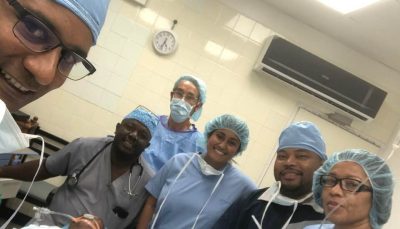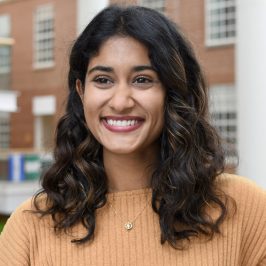Q&A with Ciera Thomas, MPH Candidate in Global Health
What drew you to the field of global health and to Gillings in particular?
The month after I took my MCAT, I had what I like to call my ‘quarter-life crisis’ (a common phenomenon for MPH students from what I’ve heard) and decided that instead of medicine, I wanted to pursue a career in public health.
My dad is an ophthalmologist and makes annual trips to Belize and Peru to train ophthalmology residents there and perform specialized surgeries, and I had been assisting for a few years in my capacity as a former nurse technician. Belize has fewer than ten public hospitals with only some of the technology needed to perform complex neuro-ophthalmic surgeries and a shortage of individuals trained to perform them as a result of brain drain, so we would have hundreds of patients come in seeking these pro-bono surgeries and could only conduct 30 or so cases in our three days there. Having to turn away people with life-threatening conditions knowing that we were their last resort broke my heart and inspired my interest in sustainable health systems strengthening to improve access to quality care.

With the care team at the Belize Council for the Visually Impaired
In searching for MPH programs, I knew that I wanted to be involved in a program that recognized the trivial nature of national boundaries and prioritized equitable and sustainable interventions. I knew Gillings was where I belonged the first time I heard “global is local” and observed the emphasis on health equity throughout the school’s messaging.
What has been your favorite class so far and why?
Hmm… I’m stuck between two and don’t think I can choose! I took an elective my first semester with Dr. Dana Rice called “Public Health Impacts of Mass Incarceration.” I was nervous about taking an elective in my first semester of grad school, but Dr. Rice was so welcoming and engaging, and the class taught me so much about the dynamics of the criminal legal system. For my final project, I learned how to create a podcast and discovered the incredible Media & Design Center in the Undergraduate Library. My other favorite class is one I’m taking this semester with Dr. Siân Curtis and Dr. Amy Bryant on Abortion Care and Policy. It’s been interesting to take this class as the impacts of the Dobbs decision have been playing out, and the class has challenged me to evaluate my perceptions of women’s reproductive health in ways I hadn’t anticipated. I leave Gillings every Monday night enthralled with what I’ve learned and even more passionate about improving maternal healthcare.
Can you tell us more about your role as Conference Co-Chair for the Minority Health Conference?
I initially chose to get involved with the conference last year in an effort to get involved in Gillings and meet new people. As the internal planning coordinator, I worked with the various committee chairs and our advisors to facilitate logistics and turn our vision for the conference into a reality. Getting to bring together 600+ participants from across the country to raise awareness of the health issues impacting marginalized communities was so meaningful, especially because we were able to elevate the voices of those who are traditionally overlooked. Last year’s theme—practicing health as a human right—was a core theoretical component of the movement to recognize holistic wellbeing as a right–not a privilege–endowed to all global citizens; I am super excited about the theme we’ve developed for the 45th conference and the conversations I hope it will inspire (stay tuned for the announcement of this year’s theme soon!).
What was the highlight of your practicum experience with John Snow International (JSI)?
This is a tough question! For my practicum, I was a monitoring, evaluation, research and learning (MERL) intern at JSI’s Center for Health Information, Monitoring, and Evaluation where I assisted in capture for a grant related to HPV learning and knowledge management, a desk review describing the average user profile of those utilizing subcutaneous depo-provera, and a case study on the use of human centered design in interventions promoting adolescent and youth sexual and reproductive health. The experience really solidified my interest in MERL in the international sphere and allowed me to put the knowledge and skills I garnered in my first year to the test. The highlight of my experience was probably being able to attend the quarterly all-staff meeting in D.C. My preceptor, the amazing Kate Sheahan, is based in Chapel Hill, so we’d been able to meet throughout the summer, but it was great to be able to put faces to names and learn more about the scope and aims of the center as a whole.
What does ‘global health’ mean to you?
In my opinion, global health in its decolonized form entails a recognition of the responsibility we have not just to ourselves and our immediate circles, but to our entire global community, to promote comprehensive health and wellbeing. This means supporting our international neighbors in pursuing policies and programs that are best suited to their healthcare needs and priorities as well as their unique life experiences through resource distribution and knowledge sharing. The peak of global health would be a world where everyone has access.
What’s your favorite dish to cook for others?
My favorite dish to cook constantly changes based on my moods and cravings, but generally, anything I get to co-create with my loved ones. I especially enjoy coming up with new dishes on weekends and holidays when I’m cooking more for the experience than the sake of feeding myself during the week. My favorite dishes are probably based off of the memories I create in making them and include learning to make my grandmother’s traditional South Indian chicken curry with her, baking Christmas cookies with my cousin Ava, and the arugula and peach salads I made with my boyfriend, Justin, this summer!



